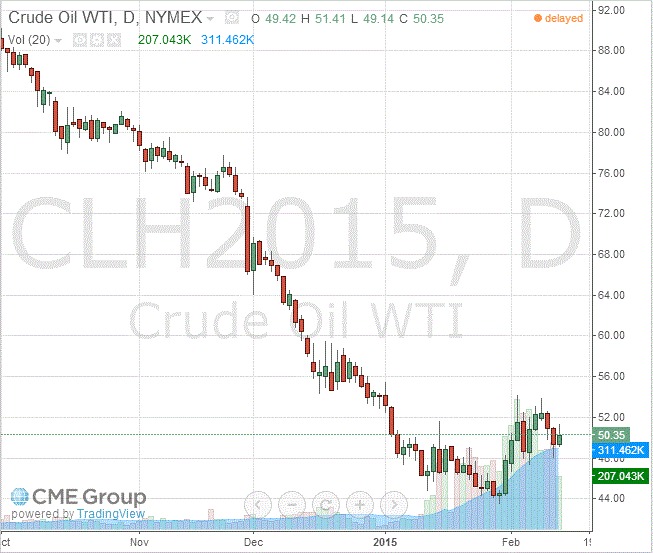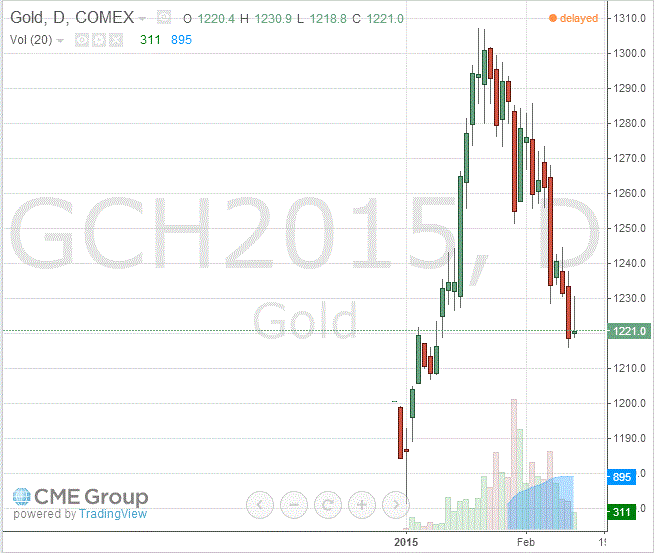Noticias del mercado
-
17:40
Oil: a review of the market situation
Oil prices rose sharply during today's session, which was caused by the weakening of the dollar in response to weak data on retail sales and the labor market in the United States. Recall weakening of the dollar increases the demand for raw materials as an alternative investment and makes dollar-denominated commodities cheaper for buyers in other currencies.
Previously submitted report showed that sales in retail stores and restaurants, the US fell by 0.8% last month. On a seasonally adjusted, they were $ 439.77 billion, said Thursday the Ministry of Commerce. Retail sales fell 0.9% in December after rising 0.4% in November. Gasoline prices falling since last summer. But even excluding purchases at gas stations, retail sales were unchanged in January after falling 0.2% in December. Except of motor vehicles, sales fell 0.9% in January after an identical reduction in December. Except as gasoline and car sales rose 0.2% in January after reading unchanged in December. Economists had expected sales to fall by only 0.3% last month. Retailers sales rose 3.3% in January compared with a year earlier - at the same pace as in December. Retail sales data can be volatile from month to month. 0.8% decline in January, was presented with the error of 0.5 percentage points.
Also, today's growth is due to the positive response to reports from Minsk, where Vladimir Putin, Peter Poroshenko, Angela Merkel and Francois Hollande for 16 hours negotiated the settlement of the situation in Ukraine. Putin said that the participants in the meeting agreed on a cease February 15 combat operations in Ukraine, as well as the withdrawal of heavy weapons.
Meanwhile, add that concern excess of stocks of raw materials today pushed aside. Recall data on oil reserves in the United States, published yesterday, showed that stocks the last week rose by 4.87 million barrels. Analysts on average had forecast an increase of only 3.75 million barrels. Production volume jumped 49 th. Barrels per day (b / d) - up to 9.23 million b / d, the highest level since January 1983.
March futures price for US light crude oil WTI (Light Sweet Crude Oil) rose to 50.35 dollars per barrel on the New York Mercantile Exchange.
March futures price for North Sea petroleum mix of Brent rose $ 1.74 to $ 56.75 a barrel on the London Stock Exchange ICE Futures Europe.
-
17:20
Gold: a review of the market situation
Gold prices rose slightly, but remained near five-week low, helped by depreciation of the dollar, and increased uncertainty regarding the Greek debt. It is learned that the negotiations between Greece and the European Union representatives were unsuccessful, although both sides stressed that the hope for the adoption of the agreement is maintained. The next round of talks scheduled for next Monday .. The term of this agreement for the provision of economic aid to Greece will expire on February 28, and the new Greek government does not want to renew it,
Also affected the course of trading posts by the Bank of Sweden, which cut its key repo rate from 0 to -0.1% and announced the purchase of government bonds with maturity of up to five years to 10 billion kronor ($ 1.2 billion). Central Bank went on these measures and "ready to do more as soon as possible" to bring inflation to the target value, said in a statement. It is 2%, and central bankers are hoping that this will happen in the second half of 2016. However, in December, consumer prices have declined at an annual rate of 0.3%. Bank of Sweden was the first central bank has set a negative repo rate. Earlier, the European Central Bank and the central banks of Denmark and Switzerland have set negative interest rates on deposits for commercial banks. Moreover, the Danish Central Bank for three weeks reduced the rate of four times and did not do it for the acceleration of inflation, and to protect the crown pegged to the euro
Market participants also drew attention to US data showing that initial applications for unemployment benefits rose by 25,000 and reached a seasonally adjusted 304,000 in the week ended Feb. 7. Economists had expected 278,000 new claims. Splash of winter weather in the north-east, may have contributed to the growth of applications for unemployment benefits. Treatment for a week to 31 January were revised to increase by 1000 to 279 000. The four-week moving average of initial claims, which smooths out volatility in the weekly data, fell by 3,250 to 289,750 last week. The report also showed that the number of people re-apply for unemployment benefits fell by 51,000 to 2.35 million in the week ended Jan. 31.
Meanwhile, the price of gold has influenced the report from the World Gold Council (WGC), which stated that the results of 2014, global demand for gold (in physical terms) decreased by 4%, reaching at this 3 thousand. 923.7 tons . Meanwhile, in monetary terms, demand fell by 14% - to $ 159.754 billion. In the WGC reported that the main component of demand remain jewelry. In 2014, their consumption was 2 thousand. 152.9 tons. We also learned that the investment demand for gold has increased by 2% in 2014 and amounted to 904.6 tons. Purchases of gold coins and bullion fell by 40% to 1 thousand. 63.6 tons, but the outflow of gold exchange-traded funds has decreased by 5.5 times to 159.1 tons.
March futures price of gold on the COMEX today rose $ 2 to 1221.00 dollars per ounce.
-
12:20
Oil: Prices recover from 2-day decline
Oil prices rebounded in today's trading after prices fell more than 7% in the last two days. Yesterday the Department of Energy has stated that during the week from 31 January to 6 February crude oil reserves rose by 4.9 million barrels to 417.9 million barrels, while the average forecast assumes an increase of 4 million barrels. It is worth emphasizing reserves reached a historical high for the entire period of reference of the statistics (since August 1982). Brent Crude added +1.79%, currently trading at USD55.64 a barrel. On January 13th Crude hit a low at USD45.19 and began to rise on reports on declining rig numbers in the U.S. and capital expenditure cuts. Crude registered the biggest 2-week gain in 17 years last week. West Texas Intermediate rose by +2.68% currently quoted at USD50.15, above the level of USD50 again.
Saudi Arabia, Iraq, Kuwait and Iran - OPEC's four biggest producers in the 12 member club - further cut prices to Asia in a fight for market share. Last week Saudi Arabia cut its prices to the lowest level in 14 years.
Worldwide supply still exceeds demand in a period of low global economic growth and the OPEC refusing to cut output rates to stabilize prices. Smaller OPEC members want to cut production but the organisation, responsible for 40% of worldwide production focuses on its fight for market share. Rising U.S. stockpiles are contributing to a global glut that drove prices lower. The U.S., Brazil, Russia and the OPEC are producing at record levels.
-
12:00
Gold prices recover from yesterday’s drop to 5-week lows
Gold is trading higher today, recovering from 5-week lows, as concerns over Greece after the Eurozone Emergency Meeting boost haven assets. The meetings failed to reach an agreement and deliver a joint statement on the outcome. Greece presented a 10 point plan to replace the bailout deal but creditors are insisting on the terms of the original agreement. Greece's bailout will expire on February 28th. Fears that Greece might leave the Eurozone, the "Grexit", support the precious metal, as decisions on the bailout-deal are postponed until next week, February 16th, were the next meeting is scheduled. Today E.U. leaders will meet at a summit.
A stronger U.S. dollar and the prospect for higher U.S. rates following last week's robust U.S. jobs report weigh on the precious metal as it is dollar-denominated and not yield-bearing.
The precious metal is currently quoted at USD1,223.60, +0,29% a troy ounce. On Thursday the 22nd of January gold reached a five-month high at USD1,307.40.
-
10:30
Press Review: Goldman: Here's Why Oil Crashed—and Why Lower Prices Are Here to Stay
BLOOMBERG
Goldman: Here's Why Oil Crashed-and Why Lower Prices Are Here to Stay
Too. Much. Oil.
Oil prices have gotten crushed for the last six months. The extent to which that was caused by an excess of supply or by a slowdown in demand has big implications for where prices will head next. People wishing for a big rebound may not want to read farther.
Goldman Sachs released an intriguing analysis on Wednesday that shows what many already suspected: The big culprit in the oil crash has been an abundance of oil flooding the market. A massive supply shock in the second half of last year accounted for most of the decline. In December and January, slowing demand contributed to the continued sell-off. Goldman was able to quantify these effects.
REUTERS
Icahn values Apple at more than $1 trillion(Reuters) - Activist investor and major Apple Inc shareholder Carl Icahn said the iPhone maker's stock should be trading at $216, far above its record high of $124.92 hit on Wednesday.
At $216 per share, Apple - already the world's most valuable company - would be worth about $1.3 trillion, or about the size of South Korea's gross domestic product.
The company is valued at just over $700 billion currently.
Icahn said Apple should be trading at 20 times earnings per share, which taken together with net cash of $22 per share works out to $216 per share.
Source: http://www.reuters.com/article/2015/02/12/us-apple-icahn-idUSKBN0LF2EU20150212
REUTERS
Greece, euro zone fail to agree on debt, to try again on Monday(Reuters) - Greece's new leftist government and its international creditors failed to agree on a way forward on the country's unpopular bailout and will try again on Monday, with time running out for a financing deal.
In seven hours of crisis talks in Brussels that ended after midnight, euro zone finance ministers were unable to agree even a joint statement on the next procedural steps. Both sides played down the setback, insisting there had been no rupture.
But Greek stock prices, which whipped higher after hours in New York on talk of an accord, sagged with disappointment when it emerged that Greece's laconic new Finance Minister Yanis Varoufakis had walked away from a draft deal to extend current credit terms after conferring with fellow Greek officials.
Source: http://www.reuters.com/article/2015/02/12/us-eurozone-greece-idUSKBN0LF1CE20150212
-
00:44
Commodities. Daily history for Feb 11’2015:
(raw materials / closing price /% change)
Light Crude 48.84 -2.36%
Gold 1,218.30 -0.11%
-


